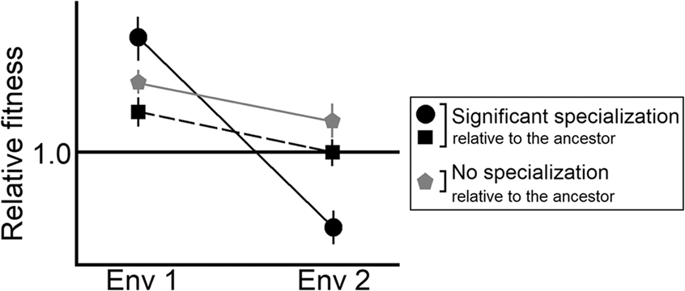Our official English website, www.x-mol.net, welcomes your
feedback! (Note: you will need to create a separate account there.)
Larger bacterial populations evolve heavier fitness trade-offs and undergo greater ecological specialization
Heredity ( IF 3.1 ) Pub Date : 2020-03-18 , DOI: 10.1038/s41437-020-0308-x Yashraj Chavhan 1 , Sarthak Malusare 1, 2 , Sutirth Dey 1
Heredity ( IF 3.1 ) Pub Date : 2020-03-18 , DOI: 10.1038/s41437-020-0308-x Yashraj Chavhan 1 , Sarthak Malusare 1, 2 , Sutirth Dey 1
Affiliation

|
Evolutionary studies over the last several decades have invoked fitness trade-offs to explain why species prefer some environments to others. However, the effects of population size on trade-offs and ecological specialization remain largely unknown. To complicate matters, trade-offs themselves have been visualized in multiple ways in the literature. Thus, it is not clear how population size can affect the various aspects of trade-offs. To address these issues, we conducted experimental evolution with Escherichia coli populations of two different sizes in two nutritionally limited environments, and studied fitness trade-offs from three different perspectives. We found that larger populations evolved greater fitness trade-offs, regardless of how trade-offs are conceptualized. Moreover, although larger populations adapted more to their selection conditions, they also became more maladapted to other environments, ultimately paying heavier costs of adaptation. To enhance the generalizability of our results, we further investigated the evolution of ecological specialization across six different environmental pairs, and found that larger populations specialized more frequently and evolved consistently steeper reaction norms of fitness. This is the first study to demonstrate a relationship between population size and fitness trade-offs, and the results are important in understanding the population genetics of ecological specialization and vulnerability to environmental changes.
中文翻译:

更大的细菌种群进化出更重的适应性权衡并经历更大的生态专业化
过去几十年的进化研究已经援引适应度权衡来解释为什么物种更喜欢某些环境而不是其他环境。然而,人口规模对权衡和生态专业化的影响在很大程度上仍然未知。更复杂的是,权衡本身已在文献中以多种方式进行了可视化。因此,尚不清楚人口规模如何影响权衡的各个方面。为了解决这些问题,我们在两种营养有限的环境中对两种不同大小的大肠杆菌种群进行了实验进化,并从三个不同的角度研究了健康权衡。我们发现,无论权衡是如何概念化的,更大的种群进化出更大的适应度权衡。而且,尽管更大的种群更能适应它们的选择条件,但它们对其他环境的适应能力也更差,最终付出了更大的适应成本。为了增强我们结果的普遍性,我们进一步研究了六个不同环境对中生态专业化的演变,发现更大的种群更频繁地专业化,并且进化出一致的更陡峭的适应度反应规范。这是第一项证明种群规模与适应度权衡之间关系的研究,其结果对于理解生态专业化的种群遗传学和对环境变化的脆弱性具有重要意义。我们进一步研究了六个不同环境对中生态专业化的演变,发现更大的种群更频繁地专业化并且进化出一致的更陡峭的适应性反应规范。这是第一项证明种群规模与适应度权衡之间关系的研究,其结果对于理解生态专业化的种群遗传学和对环境变化的脆弱性具有重要意义。我们进一步研究了六个不同环境对中生态专业化的演变,发现更大的种群更频繁地专业化并且进化出一致的更陡峭的适应性反应规范。这是第一项证明种群规模与适应度权衡之间关系的研究,其结果对于理解生态专业化的种群遗传学和对环境变化的脆弱性具有重要意义。
更新日期:2020-03-18
中文翻译:

更大的细菌种群进化出更重的适应性权衡并经历更大的生态专业化
过去几十年的进化研究已经援引适应度权衡来解释为什么物种更喜欢某些环境而不是其他环境。然而,人口规模对权衡和生态专业化的影响在很大程度上仍然未知。更复杂的是,权衡本身已在文献中以多种方式进行了可视化。因此,尚不清楚人口规模如何影响权衡的各个方面。为了解决这些问题,我们在两种营养有限的环境中对两种不同大小的大肠杆菌种群进行了实验进化,并从三个不同的角度研究了健康权衡。我们发现,无论权衡是如何概念化的,更大的种群进化出更大的适应度权衡。而且,尽管更大的种群更能适应它们的选择条件,但它们对其他环境的适应能力也更差,最终付出了更大的适应成本。为了增强我们结果的普遍性,我们进一步研究了六个不同环境对中生态专业化的演变,发现更大的种群更频繁地专业化,并且进化出一致的更陡峭的适应度反应规范。这是第一项证明种群规模与适应度权衡之间关系的研究,其结果对于理解生态专业化的种群遗传学和对环境变化的脆弱性具有重要意义。我们进一步研究了六个不同环境对中生态专业化的演变,发现更大的种群更频繁地专业化并且进化出一致的更陡峭的适应性反应规范。这是第一项证明种群规模与适应度权衡之间关系的研究,其结果对于理解生态专业化的种群遗传学和对环境变化的脆弱性具有重要意义。我们进一步研究了六个不同环境对中生态专业化的演变,发现更大的种群更频繁地专业化并且进化出一致的更陡峭的适应性反应规范。这是第一项证明种群规模与适应度权衡之间关系的研究,其结果对于理解生态专业化的种群遗传学和对环境变化的脆弱性具有重要意义。











































 京公网安备 11010802027423号
京公网安备 11010802027423号